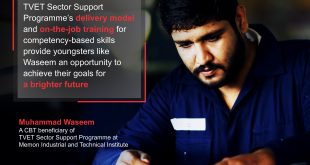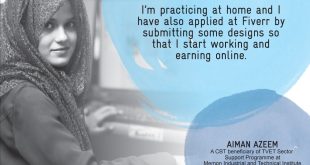Twenty-five-year-old Lousia Sharif has had a dream that she has nurtured for as long as she can remember: to educate children – especially those of the downtrodden class of society, for whom the education of their kids is nothing but an otherworldly fantasy. Hailing from the remote and volatile valley of Kurram Agency—bordering Afghanistan and a target of the worst-ever sectarian violence since April 2007—this young and energetic girl believes that only education can bring about a change for the better in the lives of the people of this region.
A few years ago she had an idea to establish an educational institute which could provide quality education in her native town, Parachinar. The large-scale closure of schools in the wake of the years-long conflict in Kurram Agency was a devastating blow to her goal; but it could not shatter her determination to advance the cause of education. In fact, it strengthened it.
For Lousia, the arrival of the Youth Engagement Services (YES) Network Pakistan’s team in Kurram Agency was nothing short of a blessing at a time when even her relatives had abandoned visiting her family owing to the precarious law and order situation in the area.
“I presented my idea of establishing a kids’ academy before the team of YES Network, which approved it and gave me the go-ahead,” she says, and adds that she got Rs. 50,000 from the YES Network as a grant under its ‘Youth Social Entrepreneurship Project in FATA’ to help make her plan a reality.

Ms. Sharif, a student of MBA (Finance), says that in her class, they study business entrepreneurship with the aim of earning a profit; but the idea of social entrepreneurship was more appealing to her because it focuses on the benefit of the people alongside profit-generating opportunities.
Presently, a five-member team of volunteers led by Ms. Sharif runs a Kids’ Academy in Parachinar where 20 students at playgroup, nursery and prep classes have been enrolled. “We charge these students Rs. 100 to Rs. 200 per month and those who cannot afford even this nominal fee are provided free education,” says Ms. Sharif. The three-hour afternoon classes start at 3 pm.
Shedding light on the project, founding chief executive officer of the YES Network Pakistan, Ali Raza Khan, says that the vision of the project was to transform the youth of the Federally-Administered Tribal Areas (FATA) from victims to leaders. “YES believes that FATA is facing a serious youth disengagement epidemic,” explains Mr. Raza. “And it is our biggest threat, biggest failure and the biggest loss.”
According to him, young people are the most overlooked resource in FATA that could potentially promote peace, prosperity and economic development in the tribal belt. With this mindset, the YES Network Pakistan has concentrated on a youth engagement approach through social entrepreneurship. The three-phased project has recently-completed its first turn, which included: social acceptability of the project; a comprehensive 50-hour training on the concept of youth social entrepreneurship; and engaging master trainers in explaining the concept of social entrepreneurship in their respective areas and institutions.
In this connection, over 4,000 young people were given an orientation on social entrepreneurship and the process of getting involved in the field of social entrepreneurship. Subsequently, 20 young teams—each comprised of five members—from across FATA and Khyber Pakhtunkhwa were selected for technical and financial assistance to start their social enterprises.
 Under the Youth Social Entrepreneurship Project in FATA, a total of 20 small projects were launched. The major goals achieved through this project include the establishment of a stress relief and entertainment centre, a biogas plant, a diagnostic lab, a computer centre for girls, a youth innovative forum, a rehabilitation project for female prisoners, a female counseling centre, a cell-phone repairing school, an English language and computer lab and a cricket academy in various parts of FATA and Khyber Pakhtunkhwa.
Under the Youth Social Entrepreneurship Project in FATA, a total of 20 small projects were launched. The major goals achieved through this project include the establishment of a stress relief and entertainment centre, a biogas plant, a diagnostic lab, a computer centre for girls, a youth innovative forum, a rehabilitation project for female prisoners, a female counseling centre, a cell-phone repairing school, an English language and computer lab and a cricket academy in various parts of FATA and Khyber Pakhtunkhwa.
Mr. Raza is confident that these social enterprises will not only direct the energies of FATA youth towards addressing serious local issues but also provide them with the opportunity to earn a living.
Shah Mehmood Khan, who runs a cricket coaching academy in Ghallanai, the headquarters of Mohmand Agency, agrees with Mr. Raza. During the month of November his Rida Cricket Academy earned him Rs 40,000. “The academy, established with the financial assistance of the YES Network, not only helped us engage our youth in sports activities but also enabled us to pay Rs. 15,000 per month to three coaches who train the members of the academy,” says Mr. Khan.
 Presently, 50 players have got themselves registered with the academy. Interestingly, consent of the parents of the intending members is a prerequisite for admission in the academy. Established in September 2012, the nascent institute has achieved remarkable successes. One of its players has been selected for the National Cricket Academy and another two for the under-16 team of the FATA region. For this, Mr. Khan gives credit to the coaches and his other team members.
Presently, 50 players have got themselves registered with the academy. Interestingly, consent of the parents of the intending members is a prerequisite for admission in the academy. Established in September 2012, the nascent institute has achieved remarkable successes. One of its players has been selected for the National Cricket Academy and another two for the under-16 team of the FATA region. For this, Mr. Khan gives credit to the coaches and his other team members.
“We have experienced coaches for bowling, batting and physical training whose commitment and dedication helped the academy attain these significant achievements at its very outset,” Mr. Khan says. Buoyed by these initial successes, Mr. Khan now plans to extend the network of his academy – initially to Safi Tehsil of Mohmand Agency and then to all the remaining tehsils of this tribal region.
Like the two social entrepreneurs mentioned above, Waheed Iqbal also wanted to set up an English and computer academy in his village, Alikhel, which lies in FR Peshawar. However, the dearth of resources was a great impediment. Holding a Master’s degree in English from the University of Peshawar, Mr. Iqbal, with his grant from the YES Network, established an English and computer academy at a hujra—male guesthouse or community place—in his village.
Out of the total endowment of Rs. 50,000, the five-man team led by Mr. Iqbal spent Rs. 45,000 on buying three computers for the academy while the remaining amount was earmarked for stationary. The team decided that initially the academy would accept only 30 students, offering them two courses—English language and basics of computer.
Mr. Iqbal says that the academy generates an income of Rs 15,000 per month despite the fact that their fee structure is much lower than that of the English language and computer institutes in Peshawar.It is worth mentioning here that the YES Network team ensured its presence at each and every step of these projects, most of which were launched in the tribal belt. To gain access to project sites in restive FATA was a herculean task. “Nine months back when we decided to launch this project there were many people around us who said it was next to impossible. But we were adamant that we must do it because we believe that if there is someone who is in desperate need of attention, it is the youth of FATA,” says Mr. Raza. He is hopeful that YES Network’s mission will go a long way towards bringing change to FATA.
 Pakistan TVET REFORM Support Programme Technical and Vocational Education and Training (TVET) Reform support Programme
Pakistan TVET REFORM Support Programme Technical and Vocational Education and Training (TVET) Reform support Programme









